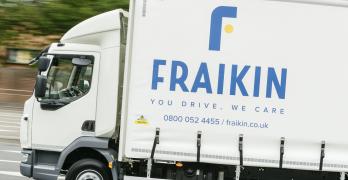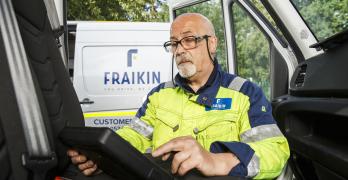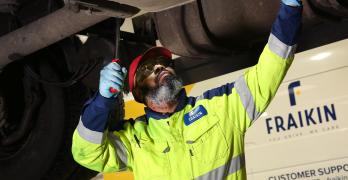Post-covid recovery : restarting fleet activity as soon as stay-at-home orders are lifted
- 11/10/21
- 4 min
While the global economy has come to a standstill for several weeks, the end of the health crisis is finally in sight. Now, it is just a question of what measures to implement to restart business after the stay-at-home period has ended. When businesses reopen, we must not just be operational, but we need to add real value to help maximise profitability for all. Colin Melvin, the FRAIKIN UK sales director, looks at the situation.

Many of the things that are relevant in the UK are reflected across all the countries in the FRAIKIN Group. Business across the group during the stay-at-home period did not completely stop. Working alongside many companies, including certain medical services, healthcare services, and other essential logistics companies, the company needed to ensure that across Europe business for these transport companies continued uninterrupted. Moving essential teams from Head Office to working remotely was one of the first steps to be implemented and was achieved without any loss of working time for our customers.
Keeping in touch with customers is critical!
Throughout the pandemic being flexible and pro-active has required rethinking our habits and real-life practices. Listening to the advice and instructions from the government and creating the proper conditions for social distancing has been a priority. Ensuring that throughout the process customers are kept informed is a simple way of building stronger relationships. Working in partnership on a day-to-day basis means that any challenges can be approached in a pragmatic way and solved quickly and coherently. Things need to be resolved efficiently when the workplace is fluid, and the situations experienced by everyone change from week to week.
From the sales perspective side of the business, a strong contact throughout the crisis will reap rewards in the future. Sending out communications every week in the early stages will keep a high-quality relationship with all customers.
When returning to more office based work, the social distancing rules will still be in place and therefore going forward advisors and technical teams will need to be more mobilised than ever. Strengthening mobile tech teams during 2020 will be inevitable , so that vehicles can be serviced on site. Saving time and money, and maximising uptime for fleets.
But in any crisis keeping your own team strong and centred is just as important as looking after your customers. COVID-19 has shown how the best companies are working together, with increased communication across departments, and with their customers. Closer contacts are needed now more than ever.
Anticipating vehicles returning to service
Companies should be reviewing their fleet before stay-at-home orders are lifted, to make sure that all vehicles are back to peak performance, whether they have been sitting unused, or working overtime to complete essential journeys. Maintenance partners will need to invest in strengthening their maintenance teams and partnerships with recognised garages. Only those with planning in place now will be able to help businesses that have either been working overtime or have completely stopped their operations.
How vehicles are used should be reconsidered, especially when several drivers are expected to take turns behind the wheel of a single vehicle. Disinfecting solutions should be made systematically available.
Making plans, anticipating, and being one step ahead
When working through this complicated and confusing time, we need to remain open and flexible, with the ability to learn more every day. One of the lessons learnt is that like in the game of chess, we always need to be thinking several steps ahead. But that’s not all! Different countries will have different approaches to, and conditions for, ending stay-at-home orders. “What we have taken from the COVID-19 crisis is the need for businesses to be flexible. In order to react and bounce back, you must be able to endlessly adapt to new conditions, new information, and constantly changing directives.” says Colin Melvin.
Drawing up a business continuity plan is a main step to take, but for most companies the key to such a plan is its adaptability. Measures taken will be dependent upon individual country requirements.
“The measures we have taken to meet the needs of our English clients have proven relevant, but they are not necessarily copied exactly in other countries where FRAIKIN operates”, explains Colin Melvin. “In order to keep its promises, FRAIKIN is taking the best from every country and establishing that our primary course of action is to be flexible and adaptable, to maintain contact with our customers and teams so we can remain mobilised and reactive.”
Also worth reading

Labour’s Autumn Budget Uncertainty Highlights the Value of Contract Hire

Driver walkaround checks: Why they matter and how Fraikin is making them easier

